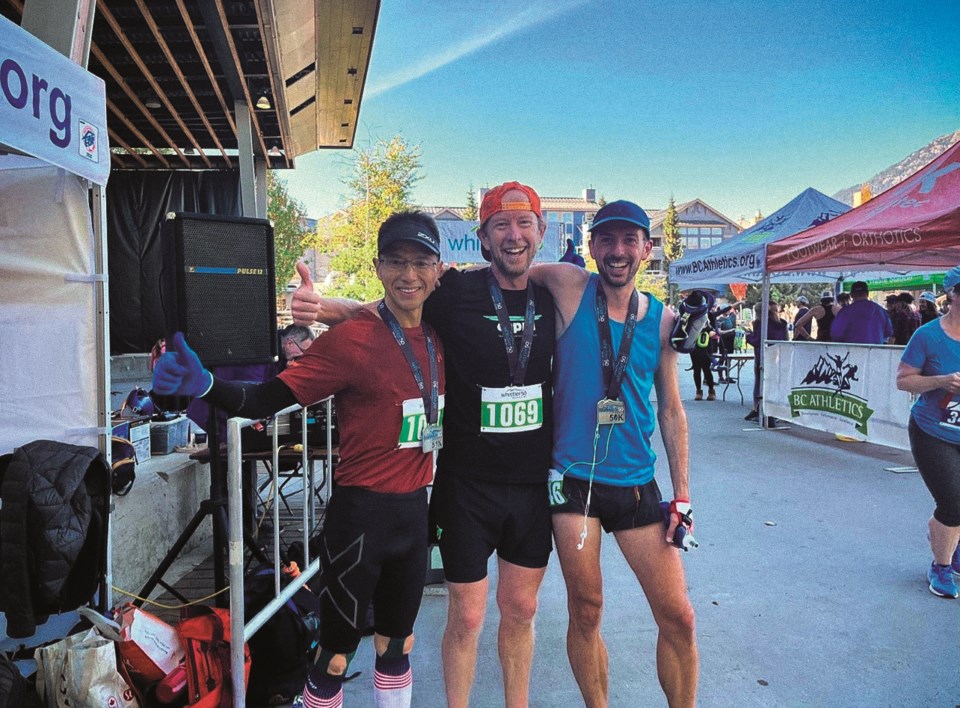James Newby headed to the Whistler 50 starting line on Saturday morning, Oct. 15, with two goals in mind.
“No. 1, to finish the race. And then No. 2 was to enjoy it,” he said. “I kind of approached it from a bit of a different angle—like no pressure, just go and have fun and then see how it goes, and if it’s going well then kind of push it in the second half of the race.”
The 50-kilometre event “was the first race I’ve done in a long time where I didn’t put any pressure on myself,” he added.
The last time Newby attempted to run an ultramarathon in Whistler—the Whistler Alpine Meadows 100-mile (160-km) race—it “didn’t go very well for me,” he admitted, citing a foot issue that forced him to drop out about 100 kilometres into the course. “So it was a little bit of redemption to be able to go and run a race and put my training to good use,” he said.
Clearly, Newby’s shift in mindset worked: redemption is exactly what the Squamish runner earned when he was first to cross the finish line at Saturday’s Whistler 50. After sitting in third for most of the race, Newby dug deep to take the lead with just about three kilometres left. “It was really exciting to have a foot race,” he said. “It was definitely a challenge.”
The first-time Whistler 50 runner completed the race in three hours, 28 minutes and 51 seconds (3:28:51), just 36 seconds faster than second-place Hong Duan of Surrey. Victoria’s Glenn Jasechko rounded out the podium in 3:33:23.
On the women’s side, Fawn Whiting from Victoria won the individual ultra in 3:53:41—she was also the only woman to finish the race in less than four hours, by a wide margin—while Coquitlam’s Alanna Hind placed second in 4:16:06. Phoebe Cseresnyes, from Kelowna, followed one minute and 22 seconds later to finish third.
Colin Hendry (4:06:38 for seventh overall) and Robyn Lucas (5:33:19, in 10th for women) were the top-finishing male and female Whistler locals, respectively.
The course follows a unique route that takes runners along five 10-km loops including sections of Whistler’s Valley Trail, past Lost Lake and through the Whistler Olympic Plaza start/finish line.
For Newby, the repetitive format worked. “Even if you’re in the lead pack, you’re running with people, because there’s all kinds of people from the relay running the same loop, and some of them are going really fast … you’re passing people, people are chatting—it’s really fun,” he said.
With energetic volunteers, solid but friendly competitors, and community support from fellow trail-users along the way, “It was good energy,” said Newby. “I think it was probably my favourite race that I’ve run.”
The sunny, clear skies and high of 22 degrees C didn’t hurt those good vibes: Saturday’s weather was a vast departure from last year’s Whistler 50, when runners battled a high of 7.9 degrees C and about 35 millimetres of precipitation. “It was a downpour,” recalled race director Dave Clark with a laugh.
“Having this sort of extended summer made for a glorious day for it,” he said. “The whole point [of the event] is to bring the running community together at the end of the running season, or near the end of the running season, and have a bit of a social, too, but historically, people have kind of come into … the après in the plaza at the start/finish line, had their pizza and maybe a drink and then they leave right away.
“Everybody stuck around this year, which was awesome, because it gave this super amazing feeling of that running community coming together,” Clark added. “It ended up being a real celebration, which is not easy to do when you’ve got an outdoor event.”
The event saw an uptick in participation from 2021, said Clark—with more than 100 runners registered, “the ultra portion of it was the biggest we’ve ever seen, probably more than twice the number that we had last year and 30-per-cent more than we had pre-pandemic,” he explained—though relay registration was still short of the crowds the race drew pre-COVID.
The 80-km relay event, featuring teams of eight each running one 10-km loop (teams of four, each running a 20-km stint can participate, too), also drew some strong competition this year: Burnaby’s Streamline Athletics group won in a combined 5:30:13, followed by a group from Vancouver Fire in second with a time of 5:34:37, and a Vancouver-based team called Chasing Rainbows in third in 6:14:31.
“To have [teams of] eight runners where everybody’s going to run faster than a 45-minute 10K is pretty incredible,” said Clark.
Still, for the race director, some of the most inspiring racers of the day weren’t on the podium.
“There’s a group of masters athletes that are primarily walkers now, and they pair up so instead of doing eight individual legs, we send two of them out at a time,” he explained. Organizers still combine the eight times, but it allows those participants to cross the finish line with a friend rather than alone.
“It’s a great way to make sure that we can be inclusive and make sure [the race] works for everybody that wants to take part,” Clark added. “It’s so motivational seeing people that, as they age, still want to take part in these things, and still find the resilience to do it.”






